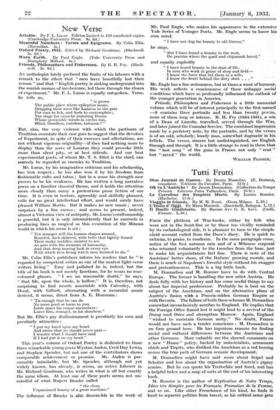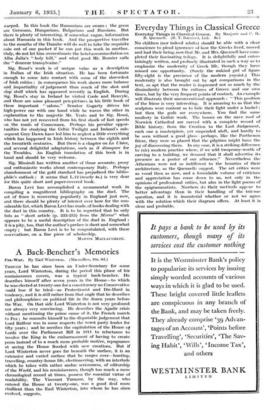Tutti Frutti
FROM the plethora of War-books, either by folk who were not in the front-line or by those too vividly reminded -by its eschatological side, it is pleasant to turn to the simple -vivid account culled from the Duce's diary. 1-1e is quick to criticize, to praise, to condemn. In the same paragraph come, notice of the first autumn rain and of a Milanese corporal who returned voluntarily to the trenches from the base, just to make his acquaintances feel fine. There is note of the Austrians' better shoes, of the Italians' growing morale, and there is much of Napoleon's forceful style without his swagger and pretentiousness. This is a big little book.
M. Donnadieu and M. Romier have to do with Central Europe. The former is handling the new relict Austria. He deals fully with her history and has some useful things to say about her imperial predecessor. Probably he is best on the subject of the Anschluss, and on the alternative plans' of Austria's fusion with a Prussia-ridden German Empire or with Bavaria. The failure of both these schemes M. Donnadieu somewhat inconclusively ascribes to England. He implies that the Foreign Office feared lest it might lead to a revival of the Drang nach Osten and strengthen Moscow. Again, England "wished to maintain German unity." No doubt, France would not have such a tender conscience : M. Donnadieu is on firm ground here. • He has ingenious reasons for finding racial and -cultural 'differences between the Austrians and other Germans. More valuable are the shrewd comments on a new " Haase" policy, backed by industrialists, armament chiefs and Tirpitz, who disliked the Anschluss as a red herring
across the true path of German oceanic development. •
M. Donnadieu might have said more about Seipel and Schober and less about the organization of Austria's pigmy armies. But he can quote his Treitschke and Sorel, and has a helpful index and a map of sorts at the end of his interesting
book..
M. Romier is the author of Explication de Notre Temps, Idees Iris Simples pour les Francais, Promotion de la PCM714Q, and so on. Like other Frenchmen of his kind, -he finds it hard to separate politics from travel, so his critical sense gets
warped. In this book the Rumanians are swans ; the geese are Germans, Hungarians, Bulgarians and Russians. But there is plenty of interesting, if somewhat vague, information about Rumania in this book. And the prospective traveller to the mouths of the Danube will do well to take the requisite coin out of one pocket if he can put this work in another. Only,-do not let him overestimate the hotelaccommodation on Alba Julia's " holy hill," and what good Mr. Romier calls the " douceur transylvaine."
Sig. Rossi's work is of unique value as a description in Italian of the Irish situation. Ile has been fortunate enough to come into contact with some of the shrewdest of Irish critics : in consequence his work shows more balance and. impartiality of judgement than much of the shot and slop 'stuff which has appeared recently in English. During Sig. Rossi's stay in Ireland he visited Coole and Renvyle, and there are some pleasant pen-pictures in his little book of these important "salons." Senator Gogarty drives his high-power ear with one hand while he waves the other in explanation to the majestic Mr. Yeats and to Sig. Rossi, who has not yet recovered from his first shock of fast speeds on the roads of Connemara. Perhaps his peculiar oppor- tunities for studying the Celtic Twilight and Ireland's sub- sequent Grey Dawn have led him to neglect a little everything which has happened in Irish history between the eighth and the twentieth centuries. But there is a chapter on Lo Ulster, and several delightful adaptations, such as if dissapore for the Troubles. An English translation of this book is in hand and should be very welcome.
Sig. Missiroli has written another of those accurate, prosy and enthusiastic works about contemporary Italy. Perhaps abandonment of the gold standard has prejudiced the biblio- phile's outlook ; it seems that L.12 (nearly 46.) is very dear for this quite short and paper-covered book.
Baron Levi has accomplished a monumental work in compiling a magnificent bibliography on the duel. The art of fence is recovering popularity in England just now, and there should be plenty of interest over here for the con- siderable list, which Baron Levi has made, of books dealing with the duel in this country. It is to be regretted that he only lists as "short article (p. 233-235) from the Mirror" what appears to be a useful description of the duel in England : it is a pity, too, that the author's preface is short and somewhat empty ; but Baron Levi is to be congratulated, with these reservations, on a fine piece of scholarship.
MARTIN MACLATIGRIAN.





































 Previous page
Previous page